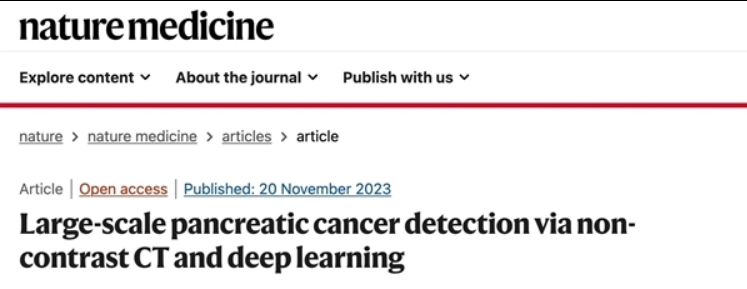Alibaba DAMO Academy Makes Breakthrough! AI Enables Large-Scale Early Detection
-
Pancreatic cancer, known as the 'king of cancers,' is one of the malignant tumors with the lowest survival rates in China and worldwide. Early-stage pancreatic cancer can achieve high resection and survival rates through surgery. However, due to its hidden location and lack of effective screening methods, 80% of pancreatic cancer cases are already at an advanced stage when detected.
However, Alibaba's DAMO Academy, in collaboration with multiple global medical institutions, has been using artificial intelligence (AI) technology to screen for pancreatic cancer in asymptomatic populations at health check-up centers and hospitals. Through simple non-contrast CT scans, they identified 31 clinically missed lesions among over 20,000 real patients, including 2 early-stage pancreatic cancer cases that successfully underwent surgical treatment.

This research was published in the top-tier international medical journal Nature Medicine and has received high praise from experts. The research team utilized a unique deep learning framework to amplify and identify features of tiny lesions in non-contrast CT images, enabling efficient and safe early detection of pancreatic cancer. They also addressed the issue of high false-positive rates in previous screening methods.
The study established the largest pancreatic tumor CT training dataset to date, validated by multiple hospitals worldwide, achieving 92.9% sensitivity and 99.9% specificity. This technology has already been used over 500,000 times in hospitals and health check-up scenarios, with only one false positive per 1,000 tests. Further clinical validation is planned for the future.
Additionally, this technology has made significant progress in detecting other high-incidence cancers such as esophageal, lung, breast, liver, gastric, and colorectal cancers. The research findings have been published in multiple medical journals and presented at top artificial intelligence conferences.
This groundbreaking study provides new hope for early screening of pancreatic cancer, potentially changing the current view that pancreatic tumors are not recommended for screening. Early detection of pancreatic cancer will help improve survival rates and provide patients with more treatment opportunities.
